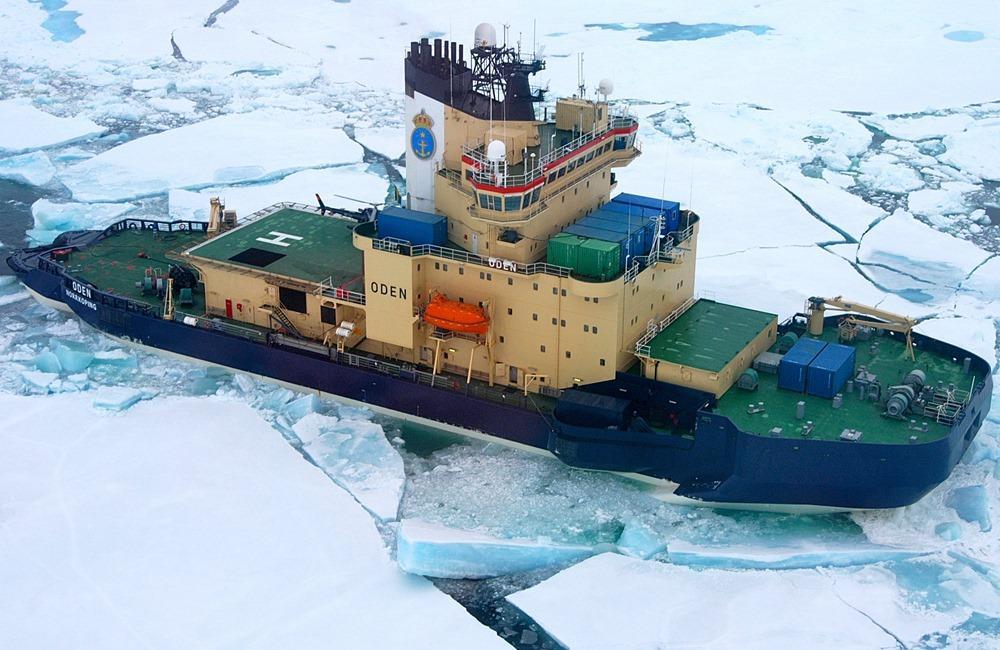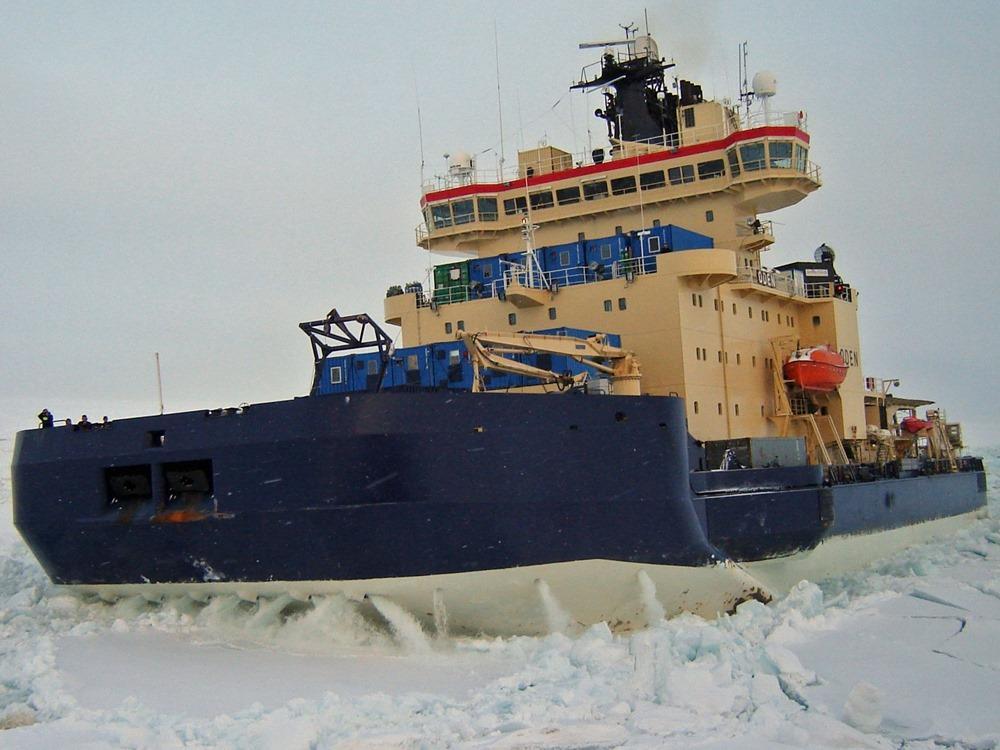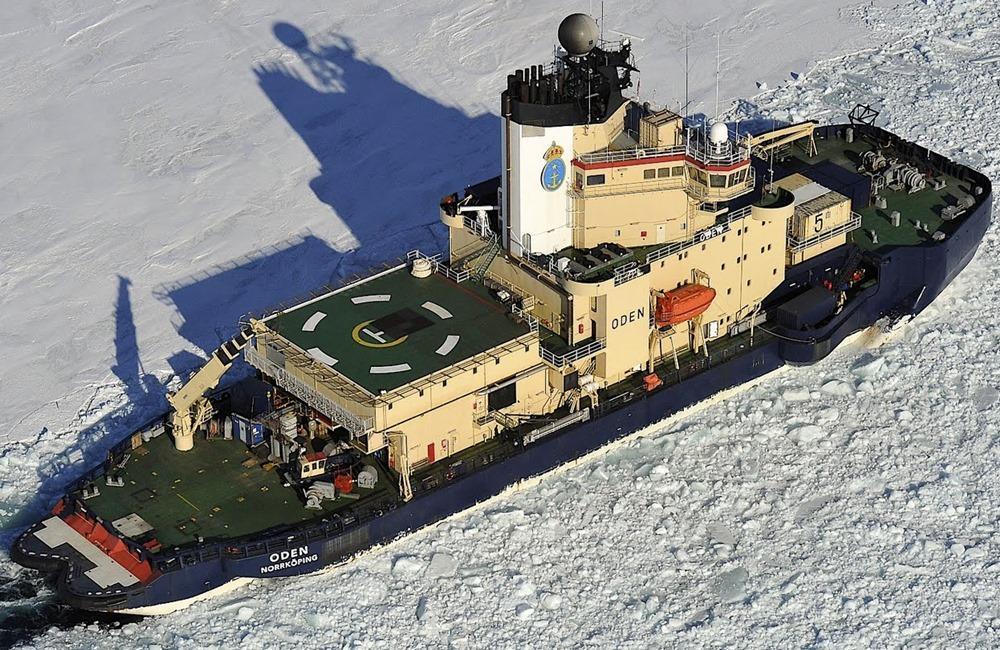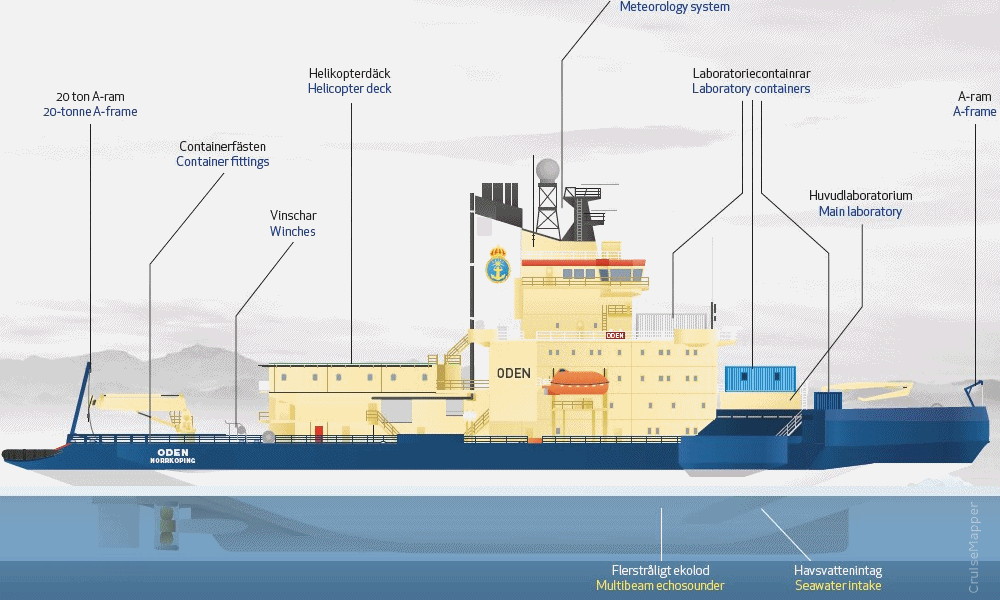Oden icebreaker
Oden icebreaker current position
The current location of Oden icebreaker is in Baltic Sea (coordinates 56.02544 N / 12.70080 E) cruising en route to Helsingborg. The AIS position was last reported 6 minutes ago.
Current PositionSpecifications of Oden icebreaker
| Year of build | 1988 / Age: 37 |
| Flag state | Sweden |
| Builder | Gotaverken (Arendal, Sweden) |
| Class | Swedish diesel icebreaker (Polar research vessel, expedition ship) |
| Engines (power) | Wartsila-Sulzer (18 MW / 24138 hp) |
| Propulsion power | 5.4 MW / 7242 hp |
| Speed | 16 kn / 30 km/h / 18 mph |
| Length (LOA) | 107 m / 351 ft |
| Beam (width) | 31 m / 102 ft |
| Gross Tonnage | 9605 gt |
| Passengers | 65 |
| Crew | 15 |
| Decks | 8 |
| Cabins | 66 |
| Owner | Sweden |
| Operator | Sjofartsverket (Swedish Maritime Administration) |
Oden icebreaker Review
Review of Oden icebreaker
The 1988-built MV Oden is a Swedish icebreaking vessel owned by Sweden and operated by Sjofartsverket (Swedish Maritime Administration). The ship is homeported in Lulea Sweden. The list of Swedish icebreakers includes Ale (1973), Frej (1975), Oden (1982) and Ymer (1977).
The vessel (IMO number 8700876) is currently Sweden-flagged (MMSI 265182000) and registered in Stockholm.
The ship's operator is a Swedish Government agency providing services to the country's transportation sector. The agency's main services are pilotage, maintenance of all Sweden's shipping lanes (including icebreaking and keeping them safe for navigation), also maintenance of lighthouses, maritime search, and rescue. Most of the agency's budget is financed through fees from commercial ships - cargo and passenger (ferry and cruise vessels).
On Polar cruises (Antarctic and Arctic scientific expeditions) the ship is chartered by the Swedish Polar Research Secretariat (Government agency under Sweden's Ministry of Education and Research).
The icebreaker Oden was originally built to maintain ice-free cargo shipping passage through Gulf of Bothnia (Baltic Sea's northernmost arm, located between Finland and Sweden). Later, the ship was modified to also serve as a scientific research vessel. It is operated in packed-ice conditions routinely and independently (without the need for additional icebreaking support).

This icebreaker is named after the god of wisdom Odin - the Norse mythology's father of all gods. God Odin was also associated with knowledge, prophecy, magic. Seeking for knowledge, he travels the realms of gods and men, caring with him Gungnir (the never missing spear) and Draupnir (the ring of magic). Odin and his brothers Ve and Vili together slew the primeval monster Ymir (the father of the giants). After that, they created the first couple of humans (Ask and Embla) out of wood. The name Odin (Odinn) in Old Norse means “furious”. From its Proto-Germanic Wodanaz version (the old Anglo-Saxon’s Woden/Wodan) originates the name for the 4th day of the week – Wednesday (starting from Sunday). The icebreaker's namesake is the Viking River Cruises boat Viking Odin (launched 2012).
Arctic and Antarctica cruise expeditions (itineraries)
Oden's scientific cruise itineraries are in both Polar regions - the European Arctic and Antarctica. In 1991, Oden became the world's first diesel icebreaker to reach the North Pole. On this Arctic cruise expedition, Oden was accompanied by the German icebreaker RV Polarstern (launched 1982). Since then, Oden has participated in several Arctic and Antarctic scientific cruise expeditions.

European Arctic itineraries usually include Laptev Sea (between Siberia, Taimyr Peninsula, Severnaya Zemlya, and New Siberian Islands), East Siberian Sea (between Siberia, New Siberian Islands, and Chukotka Peninsula) and Chukchi Sea (between Wrangel Island and Point Barrow Alaska).
The ship has also participated in numerous Canadian Arctic cruise expeditions. During the last one (in 2016) Oden assisted the Canadian Coast Guard icebreaker ship CCGS Louis S. St-Laurent on a Canadian Arctic undersea mapping expedition.
In the period 2006-2011, the ship was chartered for 5 cruises to Antarctica - 2007-2008, 2008-2009, 2009-2010, 2010-2011
In Antarctica, the icebreaker also often visits the USA's McMurdo Station (on Ross Island). In Queen Maud Land are currently operated the following research stations maintained by: Norway (Troll, Tor), Russia (Novolazarevskaya), South Africa (SANAE 4), Sweden (Svea, Wasa), Finland (Aboa), Germany (Neumayer 3, Kohnen), India (Maitri), Japan (Showa, Dome Fuji) and Belgium (Princess Elisabeth).
Oden's Antarctic cruises are usually themed on biology, oceanography and biogeochemistry research.
Oden icebreaker's schedule features the following planned for 2021-2024 Arctic expeditions:
- (2021) Synoptic Arctic Survey
- (2022) Arctic Ocean Paleoceanography (Lomonosov Ridge)
- (2023) Atmospheric rivers and the onset of sea-ice melt
- (2023) Eurasian-Arctic shelf-basin interactions of climate-cryosphere-carbon-contaminants
- (2024) North Greenland Earth-Ocean-Ecosystem Observatory
Oden vessel details and technology
The icebreaker features an aft-located helipad deck (helicopter landing platform), 1 onboard helicopter and a fore-located Cargo Deck with a gantry crane for loading/unloading cargoes, including laboratory equipment and containerized (mobile) labs.

The ship is powered by four Wartsila-Sulzer marine diesel engines (model 8ZAL4OS) each 4,5 MW or combined (max) power output 18 MW (24500 hp). The fuel is HFO (Heavy Fuel Oil), with tar-like consistency. The powerplant also includes four Sulzer diesel generators (model AT-25-H, each 1,2 MW/combined output 4,8 MW) plus one Cummins emergency generator (model KTA-38G2/power output 600 kW). The propulsion system consists of two CPPs (controllable-pitch propellers) model LIPS BV.
- Max Draught: 8,5 m (28 ft) fully loaded
- DWT Deadweight tonnage: 4906 tons
- Displacement tonnage: 13000 tons
- Icebreaking capacity: 1,9 m (6 ft) at speed 3 knots (5,5 kph / 3,5 mph)
- Bollard pull capacity: emergency pulling (250 tonnes) and towing (150 tonnes)
- Cargo capacity: 40 TEUs (containers)
- Range: 56000 km (35000 ml) at speed 13 knots (24 kph / 15 mph)
- Endurance: 100 days
- 24-hour HFO/fuel consumption: 30 m3 (at 11 knots), 60-70 m3 (at speed 16 knots)
- Tanks capacities: 310 m3 (freshwater), 3380 m3 (HFO), 990 m3 (diesel), 100 m3 (luboil)
The ship has a total of 66 staterooms (22x double cabins plus 44 single cabins), 2x Sauna Rooms, Gym, Infirmary/Hospital, Messhall/Dayroom, Conference Room, Helideck (helicopter landing pad). Potable water is produced onboard.
Lifesaving equipment includes two lifeboats (model Harding MCBR24, capacity 43 seats each, fully covered) and six liferafts (inflatable, capacity 25 seats each).
Navigational equipment includes GMDSS (Global Maritime Distress and Safety System/class "Area A4"), ARPA (Automatic Radar Plotting Aid/model Consilium Selesmar T-340), ECDIS (Electronic Chart Display and Information System/model Consilium Maris), Echo Sounder (model Skipper GDS-101), Gyro Compass (model SIMRAD), GPS Compass (model Furuno), Weather Station (model SMHI), AIS (Automatic Identification System/model SAAB R4), GPS (Global Positioning System/models Javad DGPS and SAAB R4).

Scientifical equipment includes Multibeam Echo Sounder (model Kongsberg EM122), Sub Bottom Profiler (model Kongsberg SBP120, operational depth range 50-1100 m / 164-3610 ft), open-deck structures (A-frames, winches, container labs, storage containers), indoor scientific laboratories, freezer storage. The containerized research labs are prepared for connections to water, sewage, electricity, air.
Fordeck's Main Laboratory is multifunctional, with fixtures and fittings that can be customized. The Lab is permanently equipped with a clean air system, refrigerator, freezer (-80C/1112F), fume cabinets, gas lines, seawater line, a multibeam echosounder (for 3D mapping of the seabed). The collected research data are stored on the onboard computer servers.
Note: In the case of poor AIS coverage, tracking the vessel's current location will be impossible. You can see CruiseMapper's list of all icebreakers and ice-breaking research ships in the "itinerary" section of our Icebreakers hub. All states and their fleets are listed there.



